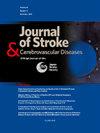接受依达拉奉治疗的脑出血患者的 IL6 和 WNK2 多态性与预后
IF 2
4区 医学
Q3 NEUROSCIENCES
Journal of Stroke & Cerebrovascular Diseases
Pub Date : 2024-10-19
DOI:10.1016/j.jstrokecerebrovasdis.2024.108095
引用次数: 0
摘要
目的:依达拉奉(Edaravone)用于脑出血(ICH)患者已有多年,但在临床中观察到其存在个性化差异。为了探索依达拉奉的精准医疗策略,本研究调查了ICH患者基因多态性与依达拉奉疗效之间的关联:方法:我们对217名使用或未使用依达拉奉的ICH患者外周血中4个潜在基因(包括COL4A2、TNF、WNK2和IL6)的7个SNPs进行了基因分型。利用 PLINK 和 SPSS 进行了关联检验、学生 t 检验、曼-惠特尼 U 检验和卡方检验:结果发现:IL6中的rs1800796(C>G)(OR:0.41,95% CI:0.18-0.94,p值=0.03)和WNK2中的rs16936752(G>T)(OR:0.28,95% CI:0.09-0.88,p值=0.02)与依达拉奉的疗效显著相关。研究发现,rs1800796 和 rs16936752 在有无吸烟习惯、饮酒习惯、高血压病史和高脂血症病史的患者中的相关性不同。这两个 SNP 与 ICH 患者的高密度脂蛋白胆固醇(HDL)浓度有关:结论:IL6 rs1800796 和 WNK2 rs16936752 可能是依达拉奉治疗期间预测预后的有用生物标志物。今后在依达拉奉的个体化医疗策略中应考虑这些 SNPs。本文章由计算机程序翻译,如有差异,请以英文原文为准。
IL6 and WNK2 polymorphisms and prognosis in patients with intracerebral hemorrhage receiving edaravone
Objective
Edaravone is utilized in intra-cerebral hemorrhage (ICH) patients for years, while personalized variances were observed in clinic. To explore the precision medicine strategy for Edaravone, this study investigated the association between genetic polymorphisms and Edaravone efficacy in ICH patients.
Methods
We genotyped 7 SNPs in 4 potential genes, including COL4A2, TNF, WNK2 and IL6, from the peripheral blood of 217 ICH patients with or without Edaravone utilizations. PLINK and SPSS were utilized for association tests, Student's t tests, Mann-Whitney U tests and Chi-square tests.
Results
Rs1800796 (C>G) in IL6 (OR: 0.41, 95 % CI: 0.18-0.94, p-value = 0.03) and rs16936752 (G>T) in WNK2 (OR: 0.28, 95 % CI: 0.09-0.88, p-value = 0.02) were found to be significantly associated with Edaravone efficacy. The association of rs1800796 and rs16936752 were found to be different in patients with or without smoking habit, alcohol drinking habit, hypertension history and hyperlipemia history were found to be different. Both of these two SNPs were found to be associated with the concentration of high-density lipoprotein cholesterol (HDL) in ICH patients.
Conclusions
The IL6 rs1800796 and the WNK2 rs16936752 could be useful biomarkers for prognosis prediction during Edaravone treatment. These SNPs should be considered in the personalized medicine strategy for Edaravone in the future.
求助全文
通过发布文献求助,成功后即可免费获取论文全文。
去求助
来源期刊

Journal of Stroke & Cerebrovascular Diseases
Medicine-Surgery
CiteScore
5.00
自引率
4.00%
发文量
583
审稿时长
62 days
期刊介绍:
The Journal of Stroke & Cerebrovascular Diseases publishes original papers on basic and clinical science related to the fields of stroke and cerebrovascular diseases. The Journal also features review articles, controversies, methods and technical notes, selected case reports and other original articles of special nature. Its editorial mission is to focus on prevention and repair of cerebrovascular disease. Clinical papers emphasize medical and surgical aspects of stroke, clinical trials and design, epidemiology, stroke care delivery systems and outcomes, imaging sciences and rehabilitation of stroke. The Journal will be of special interest to specialists involved in caring for patients with cerebrovascular disease, including neurologists, neurosurgeons and cardiologists.
 求助内容:
求助内容: 应助结果提醒方式:
应助结果提醒方式:


